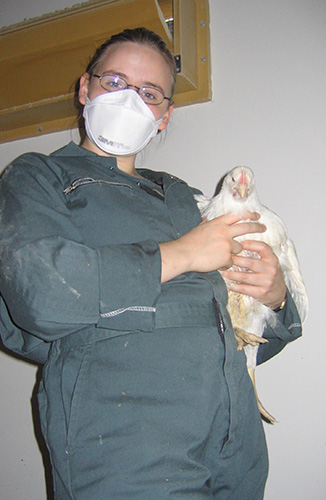Louise Sherlock
Current Position: Development Manager of the Advanced Training Partnership in Intensive Livestock Health and Production at the RVC
My first degree was in Biological Sciences at Oxford, and I chose Animal Biology as one of my final year modules, which I guess put me on the path to my PhD!

After completing my PhD in “Gene Expression and Behavioural Responses of Broiler Chickens to Production-Based Stressors”, I went on to be employed by the RVC as a postdoctoral welfare scientist. During the course of my nine month employment my main responsibility was to continue research related to my PhD in order to publish chapters from my thesis as research papers.
I also trained undergraduate students in how to search gene ontology databases and to perform some basic laboratory skills for their research projects.
I particularly enjoyed the opportunity to lead and organise the animal husbandry pig handling days for first year veterinary students. There was, of course, also the occasional frustration of repeating the same experiment several times when it failed inexplicably, and re-analysing data first tackled two years previously for my PhD to meet reviewer requirements.
By the end of my employment I had submitted two research papers and improved my existing laboratory skills, as well as learning new techniques.
My transferable skills were also improved, with an increased involvement in the administration and communication roles of both research and teaching, and an increase in responsibility for the running of the pig handling sessions. This stood me in good stead applying for my current position as Development Manager of the Advanced Training Partnership in Intensive Livestock Health and Production (at the RVC). I act as programme coordinator, requiring the ability to work well with other academics and course administrators, as well as using the organisational drive acquired from teaching responsibilities to push the programme forward.
My advice to potential post docs is to make sure you love your research. The nature of a post doc position – being on a fixed contract with no knowledge of when, or if, it will be extended – alongside the usual pitfalls of research requires the work to be worth the frustration and instability. It’s also the perfect opportunity to demonstrate transferable skills outside of research as you get more opportunities to interact with students or take on more responsibility within and outside the research environment. Whether you stay in research or not, it is certainly an experience that allows you to grow as an individual and work out what is most important from your job.
Publications
- Sherlock, L; Wathes, CM; Cheng, Z; Wathes, DC. Differential hepatic gene expression in the broiler chicken in response to the combined stressors of food withdrawal, catching and transport at the end of production. STRESS-THE INTERNATIONAL JOURNAL ON THE BIOLOGY OF STRESS (2012) 15; 3: 293-305.
- Sherlock, L; Demmers, T G M; Goodship, A E; McCarthy, I D; Wathes, C M. The relationship between physical activity and leg health in the broiler chicken. BRITISH POULTRY SCIENCE (2010) 51; 1: 22-30.
Louise Sherlock, February 2012
